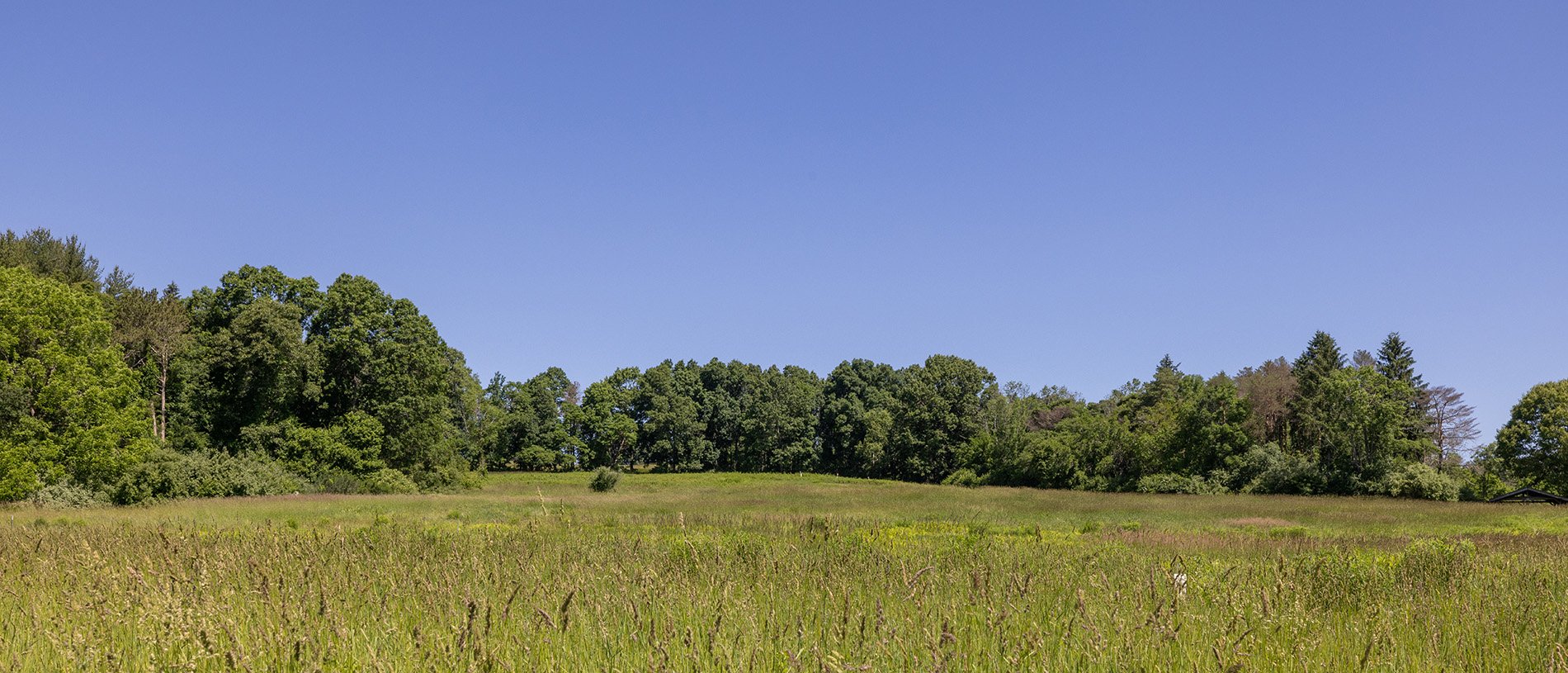Find a Bird
King Rail
Rallus elegans
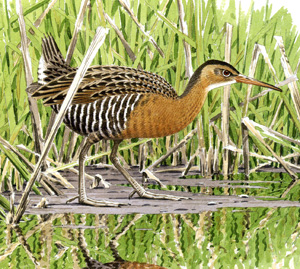
Very local, trend not established
Threatened Species
“It’s good to be the king.” – Mel Brooks, History of the World Part I
Primarily a southern species, King Rails are similar to Clapper Rails in many respects. These two species can be difficult to separate visually in the field, their habitats sometimes overlap, and they are known to interbreed and produce hybrid offspring. Regardless of their similarities, King Rails differ from Clapper Rails in a few important ways, foremost among them being voice and habitat. King Rails breed primarily in freshwater habitats in Massachusetts, and will occasionally breed in salt marshes as well. Unfortunately, the inexorable march of development may be forcing King Rails into a corner.
Historic Status
The history of the King Rail in Massachusetts is one of a species teetering on the very northern edge of its breeding range. The first identified individual in Massachusetts was shot in Nahant in 1875, although a collector in Dedham had one in his possession in 1878 that he claimed to have shot “some years before” in Sudbury (Forbush 1912). Around 1880, a Dr. L.C. Jones found “a pair of adults with a brood of young in Sandwich, several of which he caught in his hands” (Forbush 1925). Through the 1920s, Edward Howe Forbush noted that this was the only Confirmed breeding record in the state. Other Confirmations followed, all in the eastern part of the state and always sporadic, throughout the century.
Atlas 1 Distribution
Rails as a family place a premium on stealth, so it is not surprising that the species hailed as the King Rail should prove the most difficult to pin down and Confirm as a breeder. In typical rail fashion, King Rails preferred to haunt areas with abundant cattail growth, but in the Coastal Plains they also occupied their only salt marsh blocks in Massachusetts at the Parker River National Wildlife Refuge. There were signs of King Rails lurking, and possibly breeding, in wetlands in the Bristol/Narragansett Lowlands, but the only state Confirmation came from the very base of the Cape and Islands region. A fortuitous quirk of timing allowed an observer to sight a King Rail with chicks in tow crossing a Middleboro street during Atlas 1. At the close of Atlas 1, a King Rail nest had still never been discovered in the Commonwealth.
Atlas 2 Distribution and Change
Though King Rails appeared to be expanding their breeding range inland during Atlas 2, there were indications of losses in other areas. Evidence of breeding King Rails was found as far west as the Lower Worcester Plateau, and a handful of inland records were scattered across the northern Coastal Plains. Unfortunately, the species appears to have disappeared from much of southeastern Massachusetts, including the southern Coastal Plains and the Bristol/Narragansett Lowlands. This state-Endangered Species is clearly in need of additional study and protection if its future in the Bay State is to be assured.
Atlas 1 Map
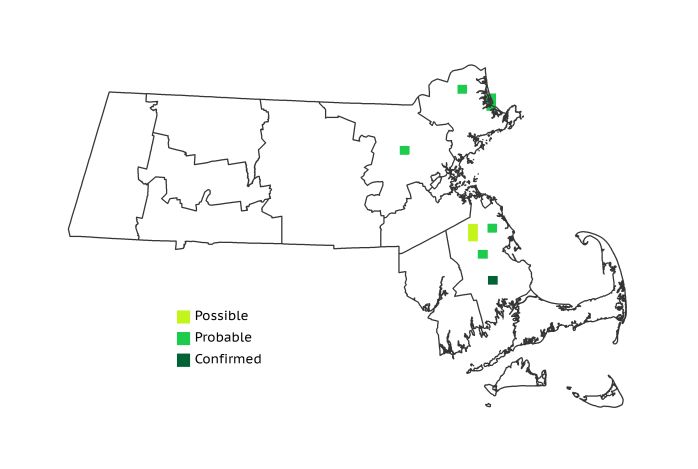
Atlas 2 Map
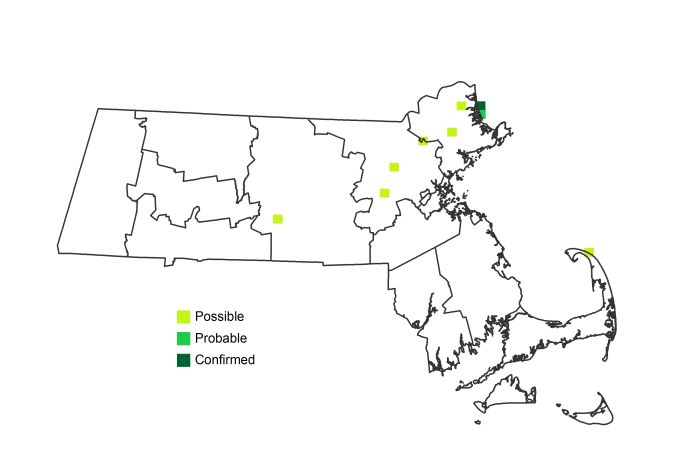
Atlas Change Map
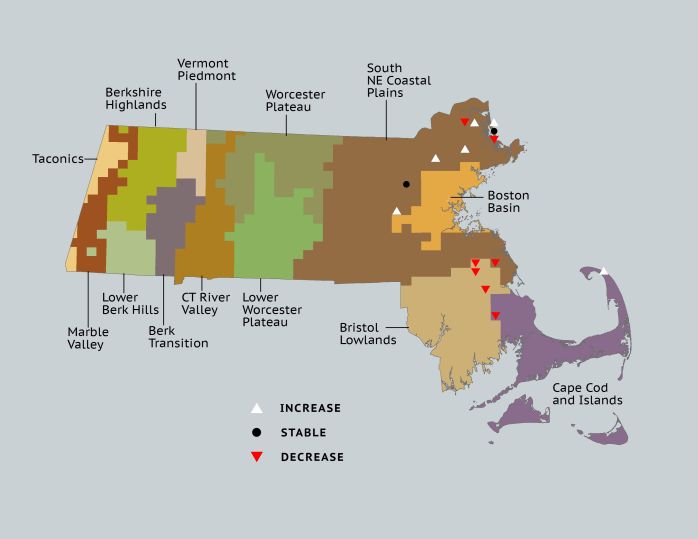
Ecoregion Data
Atlas 1 | Atlas 2 | Change | ||||||
Ecoregion | # Blocks | % Blocks | % of Range | # Blocks | % Blocks | % of Range | Change in # Blocks | Change in % Blocks |
Taconic Mountains | 0 | 0.0 | 0.0 | 0 | 0.0 | 0.0 | 0 | 0.0 |
Marble Valleys/Housatonic Valley | 0 | 0.0 | 0.0 | 0 | 0.0 | 0.0 | 0 | 0.0 |
Berkshire Highlands | 0 | 0.0 | 0.0 | 0 | 0.0 | 0.0 | 0 | 0.0 |
Lower Berkshire Hills | 0 | 0.0 | 0.0 | 0 | 0.0 | 0.0 | 0 | 0.0 |
Vermont Piedmont | 0 | 0.0 | 0.0 | 0 | 0.0 | 0.0 | 0 | 0.0 |
Berkshire Transition | 0 | 0.0 | 0.0 | 0 | 0.0 | 0.0 | 0 | 0.0 |
Connecticut River Valley | 0 | 0.0 | 0.0 | 0 | 0.0 | 0.0 | 0 | 0.0 |
Worcester Plateau | 0 | 0.0 | 0.0 | 0 | 0.0 | 0.0 | 0 | 0.0 |
Lower Worcester Plateau | 0 | 0.0 | 0.0 | 1 | 1.3 | 11.1 | 0 | 0.0 |
S. New England Coastal Plains and Hills | 5 | 1.9 | 55.6 | 7 | 2.5 | 77.8 | 2 | 0.9 |
Boston Basin | 0 | 0.0 | 0.0 | 0 | 0.0 | 0.0 | 0 | 0.0 |
Bristol and Narragansett Lowlands | 3 | 2.8 | 33.3 | 0 | 0.0 | 0.0 | -3 | -3.0 |
Cape Cod and Islands | 1 | 0.7 | 11.1 | 1 | 0.7 | 11.1 | 0 | 0.0 |
Statewide Total | 9 | 0.9 | 100.0 | 9 | 0.9 | 100.0 | -1 | -0.1 |



